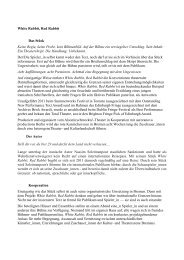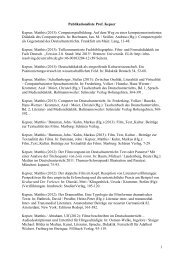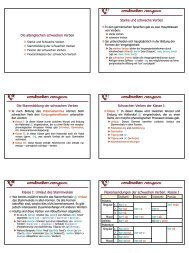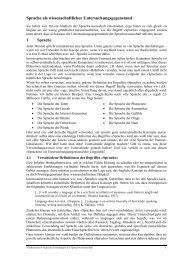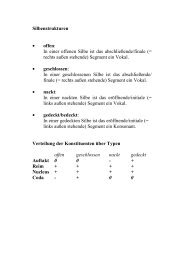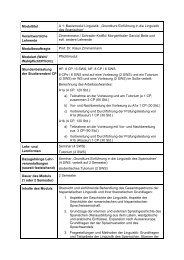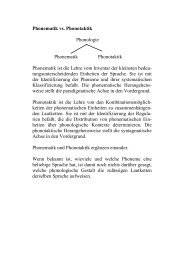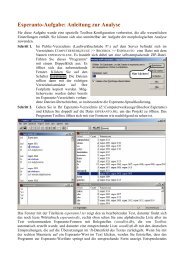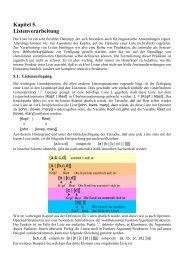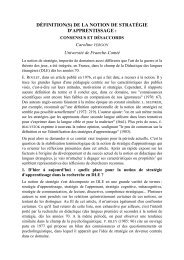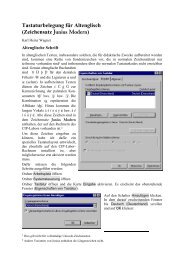Relativism and Universalism in Linguistics - Fachbereich 10 ...
Relativism and Universalism in Linguistics - Fachbereich 10 ...
Relativism and Universalism in Linguistics - Fachbereich 10 ...
Create successful ePaper yourself
Turn your PDF publications into a flip-book with our unique Google optimized e-Paper software.
Section H: Syntax 87<br />
The myth of verb cluster languages<br />
Gaeta, Livio<br />
Università di Napoli –Federico II<br />
livio.gaeta@un<strong>in</strong>a.it<br />
Recently, there have been several proposals of group<strong>in</strong>g a certa<strong>in</strong> number of languages by<br />
means of properties displayed by verb clusters such as those reported below <strong>and</strong> exemplified<br />
by German (cf. É. Kiss & H. van Riemsdijk, 2004, Verb Clusters, Amsterdam etc.,<br />
Benjam<strong>in</strong>s, for a survey):<br />
(1) a. Thomas me<strong>in</strong>t, dass die Studenten Deutsch werden lernen müssen.<br />
b. Thomas me<strong>in</strong>t, dass die Studenten Deutsch lernen müssen werden .<br />
‘Thomas th<strong>in</strong>ks that the students will have to learn German’<br />
c. Thomas ist froh, dass die Studenten Deutsch haben lernen müssen.<br />
d. *Thomas ist froh, dass die Studenten Deutsch lernen gemusst haben.<br />
‘Thomas is glad that the students had to learn German’<br />
So-called verb cluster languages are claimed to be characterized by not display<strong>in</strong>g a rigid word<br />
order pattern <strong>in</strong> multiple verb constructions, as exemplified by the auxiliary werden ‘will’, which<br />
may either open or close the verbal complex <strong>in</strong> (1a-b). Notice that <strong>in</strong> (1c-d) the phenomenon of<br />
substitutive <strong>in</strong>f<strong>in</strong>itive (<strong>in</strong>f<strong>in</strong>itivus pro participio = IPP) shows up, <strong>in</strong> which an unexpected<br />
<strong>in</strong>f<strong>in</strong>itive form surfaces <strong>in</strong>stead of the morphosyntactically “justified” past participle gemusst,<br />
which is also attested <strong>in</strong> the paradigm. In despite of the big amount of accounts worked out to<br />
derive the verb cluster properties from the perspective of universal grammar, “what still appears to<br />
be an open question is the question of why the elements of a verb cluster are <strong>in</strong>verted <strong>in</strong> certa<strong>in</strong><br />
languages <strong>and</strong> constructions. An answer to the question of what the (deep) motivation of verb<br />
cluster formation is <strong>and</strong> why this phenomenon only exists <strong>in</strong> certa<strong>in</strong> languages is still outst<strong>and</strong><strong>in</strong>g”<br />
(S. Wurmbr<strong>and</strong> <strong>in</strong> press <strong>in</strong> The Syntax Companion, Oxford, Blackwell). The aim of this paper is<br />
to reconsider the whole problem address<strong>in</strong>g this precise question: why is it so that basically West-<br />
Germanic languages share to a certa<strong>in</strong> extent the same patterns for verbal periphrases? The<br />
answer must be sought <strong>in</strong> the grammaticalization process of the verbal periphrases, which took<br />
place <strong>in</strong> the late Middle Age <strong>and</strong> accompanied the general reorganization of word order <strong>in</strong> the<br />
sentence. In particular, the mismatch given by the IPP is a consequence of the semantically<br />
grounded ban aga<strong>in</strong>st employ<strong>in</strong>g the past participle of verbs govern<strong>in</strong>g an <strong>in</strong>f<strong>in</strong>itive, for <strong>in</strong>stance<br />
<strong>in</strong> the attributive function as aga<strong>in</strong> exemplified by German: *der im Park laufen gesehene Mann<br />
‘lit. the man seen run <strong>in</strong> the park, i.e. the man who was seen runn<strong>in</strong>g <strong>in</strong> the park’ vs. der im Park<br />
gesehene Mann ‘the man seen <strong>in</strong> the park’. This is due to semantic reasons, because the past<br />
participle needs a second argument-time w<strong>in</strong>dow to be anchored at. For light verbs the latter is<br />
however saturated by the governed <strong>in</strong>f<strong>in</strong>itive, which expla<strong>in</strong>s the asymmetry mentioned above.<br />
When the perfect got grammaticalized, the potential doma<strong>in</strong> given by verbs govern<strong>in</strong>g an<br />
<strong>in</strong>f<strong>in</strong>itive could only be exploited on condition that the restriction aga<strong>in</strong>st the past participle was<br />
saved. Therefore, the arguably default form, i.e. the <strong>in</strong>f<strong>in</strong>itive, came <strong>in</strong> as a viable solution, giv<strong>in</strong>g<br />
rise to the synchronic mismatch. The word order reorganization is to be seen as connected with<br />
the developments of the periphrases, as confirmed by the future periphrasis which also shows a<br />
default <strong>in</strong>f<strong>in</strong>itive <strong>and</strong> is affected by the same scrambl<strong>in</strong>g process: as exptected, it was<br />
grammaticalized dur<strong>in</strong>g the same time span of the perfect. There is no need for assum<strong>in</strong>g a<br />
universal language group: this set of properties goes back to the particular evolution of a closely<br />
related language family. The lesson to be learned from this tricky case is as old as modern<br />
l<strong>in</strong>guistic theory: languages are the result of historical processes, <strong>and</strong> accord<strong>in</strong>gly language<br />
change (<strong>and</strong> grammaticalization) can shed light on many mismatch effects observed <strong>in</strong> synchronic<br />
grammars. Before mov<strong>in</strong>g to a universal explanatory level, the language-specific properties at<br />
stake must be carefully scrut<strong>in</strong>ized both from a synchronic <strong>and</strong> a diachronic po<strong>in</strong>t of view.



